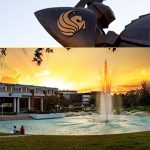University of Kansas
Overview
Since its founding, the University of Kansas has embodied the aspirations and determination of the abolitionists who settled on the curve of the Kaw River in August 1854. Their first goal was to ensure that the new Kansas Territory entered the union as a free state. Another was to establish a university.
Nearly 150 years later, KU has become a major public research and teaching institution of 28,000 students and 2,600 faculty on five campuses (Lawrence, Kansas City, Overland Park, Wichita, and Salina). Its diverse elements are united by their mission to educate leaders, build healthy communities, and make discoveries that change the world.
A member of the prestigious Association of American Universities since 1909, KU consistently earns high rankings for its academic programs. Its faculty and students are supported and strengthened by endowment assets of more than $1.44 billion. It is committed to expanding innovative research and commercialization programs.
KU has 13 schools, including the only schools of pharmacy and medicine in the state, and offers more than 360 degree programs. Particularly strong are special education, city management, speech-language pathology, rural medicine, clinical child psychology, nursing, occupational therapy, and social welfare. Students, split almost equally between women and men, come from all 50 states and 105 countries and are about 15 percent multicultural. The University Honors Program is nationally recognized, and KU has produced 26 Rhodes Scholars, more than all other Kansas schools combined.
The University of Kansas Cancer Center is the state’s only designated National Cancer Institute. Eleven other major centers oversee research in life span issues, the humanities, transportation, the environment, biosciences, biodiversity, and polar ice sheets, among others.
Nine core service laboratories and affiliated centers specialize in such fields as biomedical research, molecular structures, technology commercialization, and oil recovery. KU has service centers statewide that offer training and professional development in law enforcement, firefighting, child development, health education, and public management.
The main campus in Lawrence tops Mount Oread, known informally as the Hill. This long, curved limestone ridge was named by the town founders who for a decade endured bitter conflicts with pro-slavery factions from Missouri. A horrific guerrilla raid in August 1863 burned the town and killed 200 men and boys. Yet a few months after the Civil War ended, KU was founded, opening in September 1866.
Just 32 years later, the inventor of basketball, James Naismith, founded a beloved tradition here. The scientist who discovered vitamins A and D was a graduate. Helium was extracted from gas for the first time in a KU lab. The inventor of the time-release medication capsule taught here. Astronauts, artists, authors, business leaders, senators and governors, Pulitzer Prize winners, and a Nobel laureate launched their careers here. And thousands of teachers, nurses, physicians, pharmacists, musicians, architects, engineers, and lawyers mastered their subjects here. Welcome to their Hill.
Why choose University of Kansas?
Since its founding, the University of Kansas has embodied the aspirations and determination of the abolitionists who settled on the curve of the Kaw River in August 1854. Their first goal was to ensure that the new Kansas Territory entered the union as a free state. Another was to establish a university.
Nearly 150 years later, KU has become a major public research and teaching institution of 28,000 students and 2,600 faculty on five campuses (Lawrence, Kansas City, Overland Park, Wichita, and Salina). Its diverse elements are united by their mission to educate leaders, build healthy communities, and make discoveries that change the world.
A member of the prestigious Association of American Universities since 1909, KU consistently earns high rankings for its academic programs. Its faculty and students are supported and strengthened by endowment assets of more than $1.44 billion. It is committed to expanding innovative research and commercialization programs.
KU OFFERS YOU THE ULTIMATE COLLEGE EXPERIENCE.
Of course you’ll get an outstanding education at an affordable price. But you can also conduct research. Study abroad. Learn the Rock Chalk chant. Make friends from all over the world.
Undergraduate
- U.S. Incoming Freshmen
- U.S. Transfer Students
- International Undergrads
Graduate
- Graduate Studies
- Medical Center
- Law School
- Schedule of classes
- Continuing Education
- Nondegree: Undergrad | Graduate
- Edwards Campus
- Applied English Center
The University of Kansas is known for the high quality of its academic programs. We have more than 190 undergraduate majors in the sciences, arts, and humanities that provide a firm foundation for almost any career choice. We offer professional education in medicine, nursing, pharmacy, engineering, music, law, social welfare, journalism, business, and architecture.
Nearly 50 of our graduate programs are nationally ranked, and our University Honors Program is among the best in the United States.
You may deepen and enrich your academic experience by participating in study abroad, doing original research, or becoming involved in special programs in languages, indigenous studies, history, environmental policy or a dozen other topics.
Go ahead. Explore.
Outreach
KU is committed to educating leaders, building healthy communities, and making discoveries that change the world. We know that academic research creates positive solutions that make a practical, daily difference in the lives of our fellow Kansans and the world.
Through research and service centers at our campuses and throughout the state, we address such societal issues as mainstreaming education, environmental policy, highway safety, e-learning, biodiversity, child language development, and elder care.
We educate pharmacists, physicians, nurses, and therapists for hospitals and clinics across the state. Police officers, firefighters, and first responders receive training in new procedures. Our public radio network provides news and entertainment. Lawyers, doctors, city administrators, and teachers benefit from our professional development programs.
Collaborative programs in 14 counties counter teenage alcohol use. Scientists at the state geological and biological surveys, based at KU, fan out over Kansas to study agriculture, animal life, water usage, and oil fields. Video hookups permit community doctors to confer directly with specialists at the Medical Center, which also sponsors an alliance of regional hospitals and research units for cancer diagnoses and care. And thousands of visually impaired persons enjoy newspapers and books read by volunteers at our Audio-Reader radio service.
In these and dozens of other ways — direct service and long-term research, annual workshops or special conferences — KU works for Kansas.






